<Back to Index>
- Astronomer Antonie Pannekoek, 1873
- Painter Slava Raškaj, 1877
- Sultan of the Ottoman Empire Mehmed IV, 1642
PAGE SPONSOR

Antonie (Anton) Pannekoek (2 January 1873, Vaassen, Gelderland - 28 April 1960,Wageningen) was a Dutch astronomer and Marxist theorist. He was one of the main theorists of council communism (Dutch: radencommunisme).
Pannekoek studied mathematics and physics in Leiden from 1891. Even before he went to college he was interested in astronomy and studied the variability of Polaris. He published his first article, On the Necessity of Further Researches on the Milky Way, as a student. Some years after he had finished his study he started work at the Leidse Sterrewacht (Leiden observatory), where he wrote his thesis.
After reading Edward Bellamy's Equality, Pannekoek became a convinced socialist and started studying Karl Marx's theories. Soon Pannekoek became a well known Marxist writer, writing for both Dutch and German magazines. Dissatisfaction with his job at the observatory led him to move to Berlin, where he became a lecturer at the school funded by the Social Democratic Party of Germany. His radical opinions soon got him in trouble with both the German government and the unions.
He was on holiday in the Netherlands when the First World War broke out. Prevented from returning to Germany, he started work as a chemistry and
science teacher. Though the Leidse Sterrewacht wanted him back,
government opposition because of his Marxist sympathies made this fall
through. Instead, the Amsterdam city council got him an appointment at the University of Amsterdam in 1925, first as a part time professor, and in 1932 also as a full professor. In his scientific work, Pannekoek started studying the distribution of stars through the Milky Way,
as well as the structure of our galaxy. Later he became interested in
the nature and evolution of stars. Because of these studies, he is
considered to be the founder of astrophysics as a separate discipline in the Netherlands. Apart from his theoretical work, he also went on several foreign expeditions to observe solar eclipses and take spectra of stars. In 1926 he undertook an expedition to Java in order to chart the Southern Constellations. He was also interested in the history of astronomy and his book, A History of Astronomy, is considered a standard reference on the subject. His
work in galactic structure, astrophysics and the history of astronomy
was of international renown and won him an honorary degree from Harvard University in 1936, as well as the Gold Medal of the Royal Astronomical Society in 1951. The crater Pannekoek on the Moon and the asteroid 2378 Pannekoek are named after him. The Astronomical Institute Anton Pannekoek at the University of Amsterdam, of which he had been a director, still carries his name. As a recognized Marxist theorist, Pannekoek was one of the founders of the council communist tendency and a main figure in the radical left in the Netherlands and Germany. He was best known for his writing on workers' councils.
He regarded these as a new form of organisation capable of overcoming
the limitations of the old organs of the labour movement, the trade unions and social democratic parties. Basing his theory on what he regarded as the practical lessons of the Russian revolution, Pannekoek argued that the workers' revolution and the transition from capitalism to communism had to be achieved by the workers themselves, democratically organised in workers' councils. He was a sharp critic of anarchism, social - democracy and Lenin and Leninism. His analysis of the failure of the Russian revolution was that after Lenin and the Bolsheviks came to power, they crippled the soviets.
Instead of workers' councils, the Bolsheviks had instituted the rule of
their party, which in Pannekoek's view is what led to the institution
of the Bolsheviks as a new ruling class. He put his views forward in
his 1938 book Lenin als filosoof: een kritische beschouwing over de filosofische grondslagen van het Leninisme originally published under the pseudonym J. Harper, translated in English as Lenin as philosopher - a critical examination of the philosophical basis of Leninism (1948). In a pamphlet still quoted by present day Marxists and social activists, Pannekoek strongly attacked and rebutted the arguments of social Darwinists such as Herbert Spencer, whom Pannekoek dubbed "Bourgeois Darwinists". On the basis of Darwin's own writings - in particular on "The Descent of Man" (1871) - Pannekoek stated: